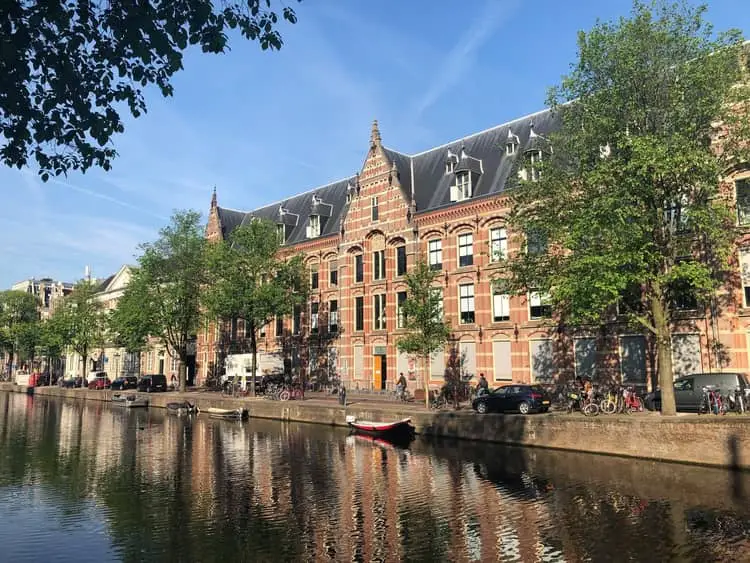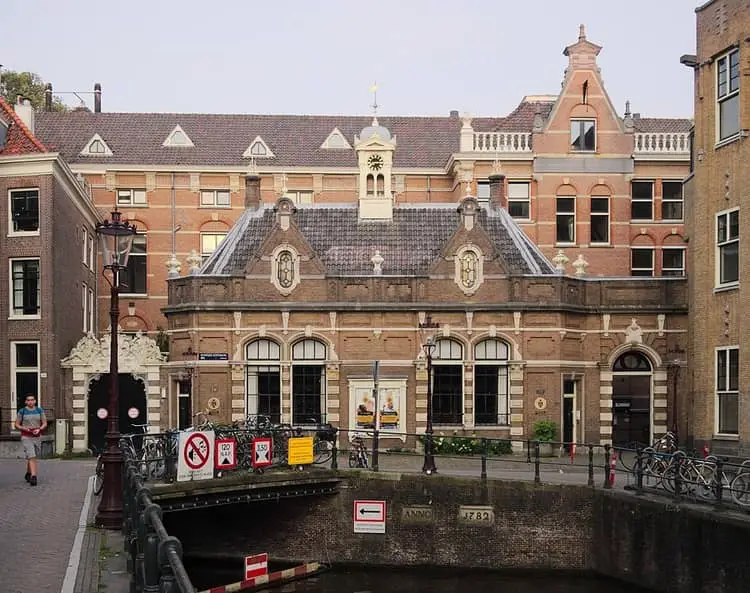According to QS World University Ranking 2019, all Dutch Universities are between the 350 best of the world. The University of Amsterdam, as well as other Dutch universities, is between the best 100 universities of the world. And not only that but it is located in one of the most amazing cities in the world.
The University of Amsterdam is number 57 on top World University Rankings. It is one of the best institutions in the Netherlands: it offers several BA and MA in English, it counts with prestigious professionals and many highlights such as cutting-edge facilities and great internship programmes.

When talking about universities in Amsterdam, the first one that comes to mind is the UvA or Universiteit van Amsterdam, the most prestigious one. In this article, we are going to explain why this university is one of the best in the world, and all the reasons why this and all of the higher education institutions in Amsterdam have nothing to envy other great universities.
Why You Should Study in Amsterdam
QS World University Ranking 2019 is one of the most widely known and prestigious world university rankings. All of the universities in the Netherlands are included in their list, and the UvA is on the top 100. In this ranking, the factors that play a role are the satisfaction of the students and employers, independent studies of the work of each faculty or department, internationality, research and reputation. These are some of the highlights that make the UvA excel as an institution. So, how does this translate for students?
First of all, the Netherlands counts with a large number of international students due to the big-availability of English-taught programmes in all fields. The UvA counts with over 15 BA and MA full programmes from a broad range of fields, from Economics to Language and International studies.
Not only everybody speaks English, but it is true that some of the programmes are open to students from all over the world and are aiming to prepare Dutch students to develop in international environments and to be able to make exchange having compatible courses.
English speaking countries such as Australia, the US and the UK tend to have a higher tuition fee set for most programmes. This makes the Netherlands a very competitive place to study, offering two types of tuition fees, one for EU students, who are entitled to Government help, and one for non-EU students, who end up paying an even cheaper fee than in their home countries, for an equally good, or even better education.

In the case of hogescholen (or University of Applied-Sciences), there are some programmes in English. Among the most popular ones in Amsterdam you can find:
- Amsterdam University of Applied Sciences (with 11 programmes in English)
- Gerrit Rietveld Academie (over 13 BA and 5 MA in English, as well as temporary programmes)
- Conservatorium van Amsterdam (all its programmes)
- Amsterdam University of the Arts (34 English-taught programmes)
In the case of the Vrije Universiteit, another top 100 of the world, is also a great option for those interested in studying at a research university. The main difference with the UvA is that it only offers bachelor programmes whereas the UvA has many MA and PhD programmes.
How is Studying in Amsterdam
- Autonomous work: as I mentioned in my previous article about studying in Amsterdam, autonomous work is one of the deal breakers for international students. In the article, I was explaining how getting in is not as hard as staying. Autonomous work will be expected from every single student. This is both a blessing and a curse. The idea is that you need to learn how to become your own person and organise your own schedule. Coming directly from high school or from different countries where the level of freedom is close to 0, this abrupt change can be either something positive or negative. But if you overcome it, having your own schedule and organising your time will bring you many positive things such as being able to grow up, get a job if you have to thanks to the flexible timetables, choose the subjects that you want no matter what programme you are studying, and be free to spend your time however you want. This autonomy will definitely prepare you for your future academic career.
- Small-groups: Dutch professors and Dutch institutions believe in reducing the working groups. Lectures count with a maximum number of students (a maximum number of 20), but these get reduced into smaller groups. Imagine that you are taking a course in Literature: there are several ways of dividing the group to make it more dynamic; once a week you will have a seminar, and once or twice a week you will have seminars, where you will get the chance to work in smaller groups, get the chance to talk to the professor individually and get to meet your classmates. In more practical subjects, smaller groups are great to get to practise what you learn multiple times, as well as solving your doubts individually.
- Closeness: one of the first things that surprised me when I started studying in the Netherlands, was the close relationship students and professors have. It is not only that you get to call them by their first name, but also that you are one of them, your opinion matters and your knowledge is valid. Coming from a hierarchical system, I was surprised that professors would give you their phone numbers in case you need them after class, almost as much as I was the first time one invited me for coffee at this cool place just around the corner to discuss my paper. It is a new experience, but it is positive, you feel appreciated, you are given a voice and you are much more encouraged to participate and learn from your mistakes. We are all human, and we are all learning!
- Open-mindedness: closeness and open-mindedness are very closely related. Dutch society, in general, is very open-minded. They are proud to call themselves tolerant, and they will accept almost anything that doesn’t harm them nor changes the structure they need to make everything work their way. This characteristic is translated in the academic world as: you do whatever you think it’s right, we are here to learn. If you come from a different background and you have a different way of seeing and doing things, just speak up! you have high chances that your professors and classmates are going to be interested in knowing more about it.
- Melting pot: this one is closely related to the last point. This open-mindedness and tolerance have made this country a melting pot of cultures. Amsterdam is one of the best examples in the world, where more than 180 cultures live together in harmony. It is an amazing city to meet people from all over the world, learn languages, get to know more about different cuisines, and this also applies to your studies. You will be sharing your classes with people from the most remote places in the world. English is the tandem language and everybody is happy to speak it, professors encourage students to take advantage of this amazing opportunity of learning ones from the others. This exchange can only be beneficial for your personal growth.
- Great internship programmes: studying in Amsterdam will give you the opportunity to work in many prestigious and international companies and institutions that you may not have the chance to work with, in any other place. For instance, the Art restoration programme of the UvA gives you access to work at the Rijksmuseum. Studying engineering means high chances of working with or for KLM. Law and languages mean working for the tribunals and international companies in the Hague or Amsterdam, and so on. Living and studying in Amsterdam means having access to the headquarters of many companies that would make your CV stand out.
- Language academies: both research universities count with a language academy of their own. This means that as a student of the UvA you will get a discount if you want to study Dutch with them at the INTT, and as a student of the VU you will also get discounted if you want or need to study Dutch. In any other case, you will have the advantage of being in Amsterdam, and that means that you will have access to everything you need, including language academies for almost any language that you want to study.
- Facilities: you only have to check out any of the institutions linked on the list above. This country’s facilities seem to be the order of the day. The fact that tuition is not that expensive, it doesn’t mean that money is not invested in studies: the Dutch Government’s funds make Dutch higher education institutions some of the best and most modern in the world. Any technology that you may need for your studies will be provided, libraries will provide with books, and the money invested is also seen in the great staff universities such as the UvA and the VU have with them.